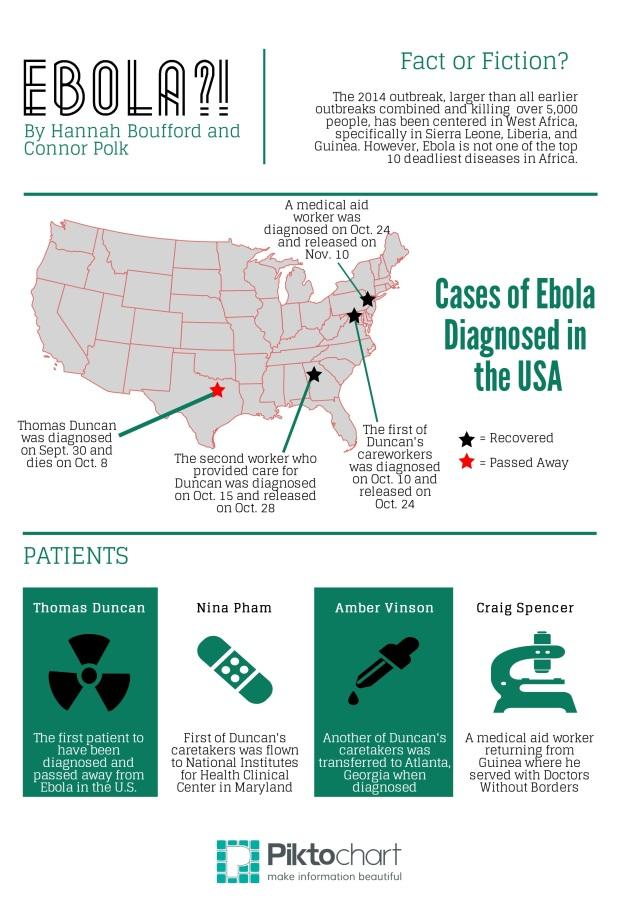The 2014 outbreak, larger than all earlier outbreaks combined and killing over 5,000 people, has been centered in West Africa, specifically in Sierra Leone, Liberia, and Guinea. However, Ebola is not one of the top 10 deadliest diseases in Africa.
Fact:
Fact 1: The virus is actually easy to avoid, especially in the United States.
One can avoid contracting the virus by simply washing their hands and avoiding infected areas and people. It is considered low-risk in the United States. According to The Washington Post, the U.S. has been cleared of all known Ebola cases as of November 10.
Fact 2: The epidemic has reached areas worldwide, including the United States.
Ebola has spread around the world, however every case, excluding those of three nurses, have been contracted in West Africa. The three nurses include two American nurses who took care of Thomas Duncan, a Liberian who became the first patient to die from Ebola in the United States, and one Spanish nurse. The Spanish nurse was the first case of Ebola that was contracted outside of West Africa. All three have since recovered. Deaths from the virus have been recorded in Liberia, Guinea, Sierra Leone, Nigeria, and the United States. Germany, France, Norway, the United Kingdom, and the United States have all treated patients who contracted the disease in West Africa.
Fact 3: There is no certified cure or treatment available for Ebola at the moment.
While there are multiple vaccines being worked on to cure Ebola, the CDC has yet to confirm one as the cure or regulated treatment for Ebola. The CDC says that the best way to treat Ebola at the moment is to treat the symptoms as they come by “providing intravenous fluids (IV) and balancing electrolytes (body salts), maintaining oxygen status and blood pressure, and treating other infections if they occur.” Other treatments are being tested for safety and effectiveness, though the CDC says they are underway.
Fiction:
Myth 1: We’re all going to die…!
The virus actually has a very low risk factor in the United States due to the nature of the virus not spreading through casual or airborne contact. One would be more likely to contract the flu. High risk factors include traveling or working in infected areas, handling animal or human remains, or working with animals (such as monkeys or fruit bats) in West Africa.
Myth 2: The disease can be spread through contact with an infected person and it is airborne.
Ebola cannot be spread through casual contact or coughing. Ebola spreads through contact with bodily fluid or infected needles. The virus is not airborne, and is only contagious when symptoms are present. Symptoms can occur 2-21 days after contracting the disease and often include flu-like symptoms as well as vomiting, red eyes, (bloody) diarrhea, raised rash, chest pain/cough, stomach pain, severe weight loss, bleeding (especially from eyes), bruising, and internal bleeding.
Myth 3: Planes and air travel are enabling the spread of Ebola.
John F. Kennedy in New York, Newark Liberty in New Jersey, Washington Dulles in Virginia, Hartsfield-Jackson in Atlanta, and Chicago O’Hare take the temperatures of many passengers arriving from infected areas in West Africa because early Ebola victims have a fever when the virus begins showing symptoms. Starting on Oct. 22, travelers from Liberia, Sierra Leone, and Guinea were forced to funnel through these five airports, where security was to screen most passengers’ early symptoms. President Obama followed the advice of many health officials and said that “a travel ban is less effective than the measures that we are currently instituting.”












